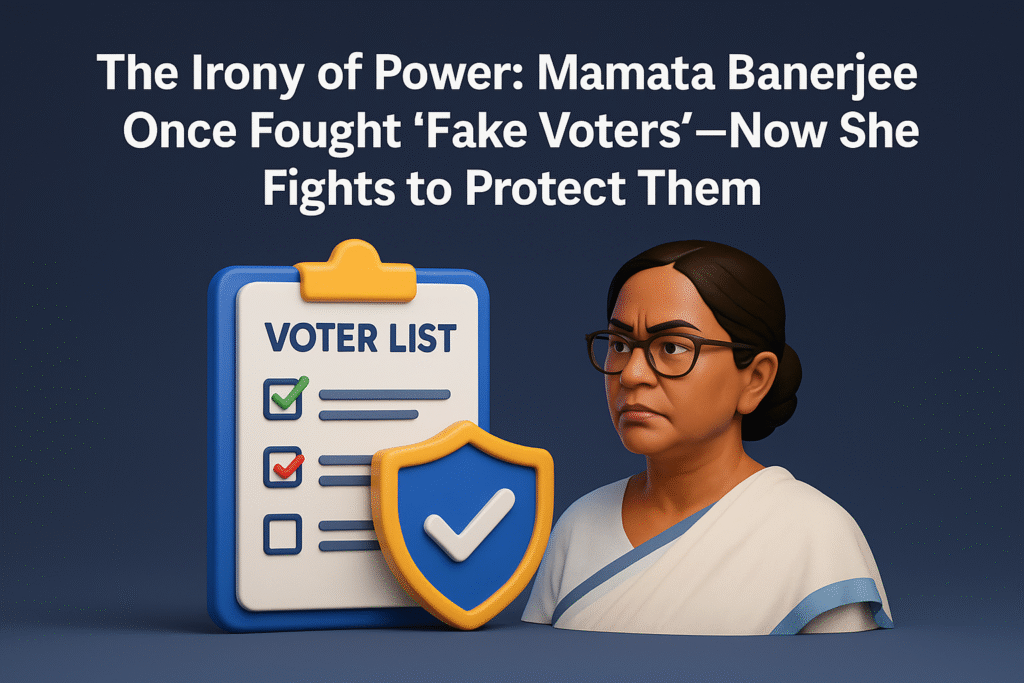Mamata Banerjee rose to power questioning voter roll legitimacy—15 years later, she defends it. Explore the political irony behind West Bengal’s voter surge, SIR resistance, and the Diamond Harbour controversy.
In 2009 and 2011, Mamata Banerjee’s rise to power was fueled by a bold narrative: the electoral rolls were bloated, fake voters were being used to rig elections, and the Left Front had corrupted the democratic process. That cry for electoral purity helped catapult her into the chief minister’s office with massive public support.
Fast forward 15 years, and we’re seeing a stark reversal. Today, as the Election Commission initiates Special Intensive Revision (SIR) to clean and verify the voter rolls, it’s Mamata who’s warning citizens not to cooperate—framing it as a threat to democracy and even likening it to NRC.
This transformation—from firebrand reformer to defender of the very system she once denounced—underscores how power can shift perspectives. What was once labelled a threat to democracy is now portrayed as its protectorate.
The question that emerges isn’t just about voter data. It’s about political memory, consistency, and the risks of defending institutions only when they serve one’s current position.
Is this evolution, or political convenience?
Understanding Mamata Banerjee’s Concerns Over SIR
West Bengal Chief Minister Mamata Banerjee has voiced deep concerns over the Election Commission’s implementation of the Special Intensive Revision (SIR), characterizing it as a veiled attempt to enact an NRC-like citizen registry. She’s publicly cautioned citizens against filling out SIR forms “without knowing the details”, The Times of India. Her warning stems from fears that this voter list revision could disenfranchise legitimate Bengali-speaking voters, especially migrants who fear losing their citizenship The Times of India. The tension escalated when the state’s Chief Electoral Officer claimed readiness for SIR without state government consultation, prompting sharp political resistance The OpIndia.
TMC has ramped up protests, framing SIR as part of a political strategy to suppress the vote share that helped win the 2021 assembly landslide OpIndia. In national fora, TMC criticized the move as a backdoor NRC, referencing large voter additions in states like Maharashtra to underline the potential for manipulation. The Times of India.
2. Is the Voter Surge in West Bengal Justified?
West Bengal’s registered voter base has soared, currently at around 73 million The Times of IndiaWikipedia. In 2021 alone, over 20 lakh new voters were added to the rolls amidst the pandemic, with high overall turnout (~82%) Wikipedia. These numbers can be attributed to natural population growth, better voter registration drives, and heightened voter engagement.
Moreover, hundreds of thousands joined the voter lists post-pandemic as civil mobilization and rural outreach intensified. However, political rivals and some TMC critics claim these integers could mask improper registration. Notably, Suvendu Adhikari’s letter flagged 70,000 new applications, urging scrutiny around domicile certificates and insisting any post-July 25 documents shouldn’t be accepted under SIR The Economic Times.
3. Spotlight on Diamond Harbour: A Micro-Level Anomaly
The Diamond Harbour constituency—represented by Abhishek Banerjee—has attracted attention for its unusually high voter increase. BJP alleges that 301 booths within the constituency registered a 15% surge in voters over four years—claiming 2.7 lakh “doubtful voters” added, all in booths won by TMC The Times of India.
TMC rebuffed these allegations, noting that the entire election process was overseen by the Election Commission under CAPF cover, and questioned why no protests were raised earlier during polling The Times of India. Abhishek Banerjee also challenged the legitimacy of the current Lok Sabha, demanding its dissolution and fresh elections before SIR could be justified nationwide The Times of India.
4. Comparing with Other States
Similar voter roll revisions and surges have appeared in other BJP-ruled states. Maharashtra added 40 lakh voters post-2024 Lok Sabha polls, raising eyebrows about timing and intent The Times of India. In Bihar, SIR has already begun, triggering unified pushback from opposition parties, including TMC The Times of India.
These developments point to a broader pattern of voter list manipulation concerns in politically sensitive or opposition-led states, raising red flags about selective implementation and timing.
5. Balancing Legitimate Growth vs. Political Manipulation
The surge in voter numbers in West Bengal could be legitimate—fueled by demographic momentum and improved electoral enrollment. Yet, the political context—2026 assembly elections—and the contentious rollout of SIR—make it imperative to assess data carefully.
Mamata Banerjee’s distrust stems from concerns that valid citizens are being targeted, particularly by a mechanism that seemed rushed and lacked transparent state consultation The Times of India. Legislative and street-level resistance amplifies the perception that equity, not bureaucratic fairness, motivates the revision.
Conclusion
West Bengal’s growing votership is partly justified by demographic and administrative factors, but the lack of transparency, political timing, and localized surges (like Diamond Harbour) fuel justified suspicion. The SIR debate encapsulates the tension between electoral integrity and political advantage. Ultimately, transparency, state involvement, and judicial oversight are needed to ensure legitimacy and public trust.

